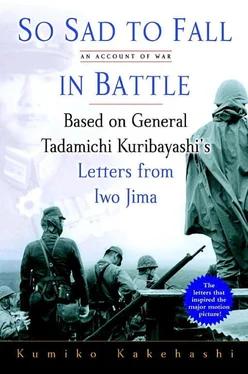Funazaka Hiroshi, a survivor of Angaur, another island where the Japanese forces were defeated, has written numerous nonfiction works about the battles of the Pacific islands. In Iô-Jima Aa! Kuribayashi Heidan ( Iwo Jima: Alas, Kuribayashi’s Army Corps! ) he includes the following anecdote:
At the same time as making his defensive preparations stronger, Lieutenant General Kuribayashi had something else in mind. He had been in America from 1928, and Canada from 1931, for military study, and he understood their fearful industrial power. When Major General Sanada and Rear Admiral Nakazawa were leaving the island, he asked them to deliver a detailed report that he had written to the Imperial General Headquarters.
The report urged them to “urgently appraise the fighting power of the American forces, and the economic strength of the United States, and make efforts to conclude peace after the fall of Saipan.”
Typically for staff officers of the time, they did nothing more than exchange looks of astonishment. Worried that Kuribayashi’s report would sap the fighting spirit of the unit, they kept it to themselves and never breathed a word about it to anybody else even after getting back to the mainland.
Major General Sanada and Rear Admiral Nakazawa were the operations chiefs of the Army and Navy General Staffs, respectively, who flew over from Imperial General Headquarters in August 1944 to inspect Iwo Jima.
Naturally enough, this episode does not appear in the official history. But in the course of interviewing many different people about the incident, I was told that a soldier had seen Kuribayashi discreetly slipping a letter to Major General Sanada as he was leaving with the words, “This is what I really think.” The soldier in question survived the battle but is now dead. He is said to have worked near Kuribayashi in the staff officer section at headquarters.
At this late stage, it is almost impossible to confirm whether this furtively handled report really existed or not. What is certain is that Kuribayashi did believe that “exacting the maximum bloodshed from the U.S. forces on Iwo Jima would work to Japan’s advantage in negotiating an end to the war.”
THE JAPANESE COMBINED fleet suffered an overwhelming defeat in the Battle of the Philippine Sea, and when Saipan fell on July 7, it was clear that Japan had no chance of winning the war. By August, when the operations chiefs came to Iwo Jima, Kuribayashi was convinced that Japan was doomed to defeat. Even some of the army leadership were starting to wonder how they could bring the war to an end.
A letter that Kuribayashi wrote to his wife on August 25, 1944, shows that he believed Japan’s defeat was inevitable: “Henceforth our fearful destiny is to lose this war and there’s no way of knowing what’s going to happen. It is crucial that, woman though you are, you be strong—strong so you can live through it all.” And on October 19, 1944, he wrote:
I am past caring about myself and am ready, no matter what. But if we are defeated and the Americans invade via the Kantô Plain, Japan will fall into unimaginable chaos. What will happen to you, a mother with children? It’s agony for me to think about it. Even if something awful like this happens, don’t give up, be strong, be positive, and live through it all.
Normally, such a letter would not get through the censors, and it reached his family only because he was the commander in chief. Interestingly enough, the censor’s mark stamped on Kuribayashi’s letters from Iwo Jima reads “Fujita”—probably Kuribayashi’s adjutant, First Lieutenant Fujita Masayoshi.
Either way, Kuribayashi knew that the day of Japan’s defeat was not far off. We do not know if he sent a report to his superiors at Imperial General Headquarters urging an early end to the war, but we do know that it was for the civilians who would experience the “fearful destiny” of defeat that he devised his strategy of how to fight most effectively on Iwo Jima
“KURIBAYASHI WAS AWARE of American public opinion when he chose to wage a bloody war of attrition. He wanted to make the American people sick of the war by drawing out the battle and inflicting heavy casualties on the Americans.” So James Bradley told me. Bradley is the author of the bestselling book Flags of Our Fathers , which was published in 2000 in the United States. James’s father, John Bradley, went to Iwo Jima as a twenty-one-year-old medical corpsman and survived. There is a picture widely seen as the most famous war photograph in the world. It shows six soldiers raising the Stars and Stripes on a mountaintop that is strewn with shrapnel. The man in the center of the group is James Bradley’s father.
The place where this photograph—later awarded the Pulitzer Prize—was taken: Mount Suribachi in Iwo Jima.
The act of raising a flag on enemy territory signifies victory and conquest. The American people already knew every detail of the dreadful battle on Iwo Jima from news reports, but when they saw this photograph they became passionate about a victory earned through so much loss and sacrifice. The photograph became a kind of icon; it was turned into a postage stamp, and, after the war, an enormous bronze statue in Arlington National Cemetery.
After his father, a national hero, died, Bradley retraced his experiences. As a result, he knows everything there is to know about the battle of Iwo Jima. On reading his book, I was struck by the fact that, while few present-day Japanese are familiar with Iwo Jima, in America the story of the battle continues to be handed down from generation to generation, and Kuribayashi is greatly respected by military men in the United States. And thus it was that I went to visit Bradley in Rye, New York, in the fall of 2004.
Bradley sees Kuribayashi as “the man America respected the most, because he made them suffer the most,” and during my visit he explained his favorite theory to me: that Kuribayashi had developed his strategy based on his awareness of the fickle tides of public opinion in the United States.
“Americans have always taken casualties very seriously. When the number of casualties is too high, public opinion will boil up and condemn an operation as a failure, even if we get the upper hand militarily. Kuribayashi had lived in America. He knew our national character. That’s why he deliberately chose to fight in a way that would relentlessly drive up the number of casualties. I think he hoped American public opinion would shift toward wanting to bring the war with Japan to a rapid end.”
American civilians were certainly following every detail of the progress of the battle on Iwo Jima with bated breath. The volume of news they received, and the speed at which they received it, were unimaginable by the standards of Japan at that time.
The New York Times ran no less than sixty articles on Iwo Jima between February (when the invasion started) and March. Articles sent from correspondents at the front would be churning out of the presses only twenty-four hours later. And while it took two days for photographs from Iwo Jima to get to the continental United States, their quantity and their quality were superior to any other battle in World War II.
The staff of the broadcast networks had also come out to the war front, and radio reporters made live commentaries from aboard the battleships anchored off the island, and from the beaches where the American forces had landed.
Amid this flood of information, the American people were horrified to learn that in the first four days after the landing, the battle on Iwo Jima had produced more casualties than five months of jungle fighting on Guadalcanal. Public opinion grew agitated, and there were letters and articles in the newspapers: “Please stop sending our finest youth to be murdered.” “The commanding officer should be replaced.”
Читать дальше












